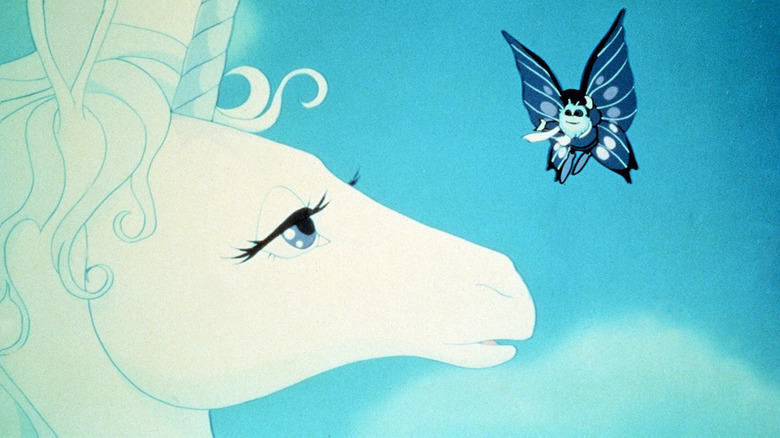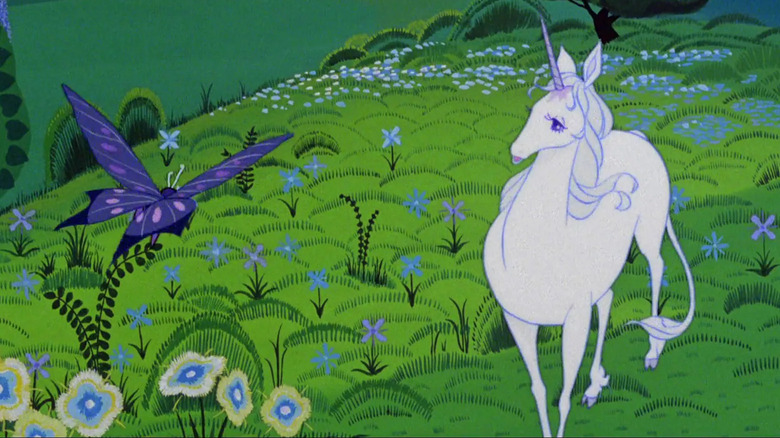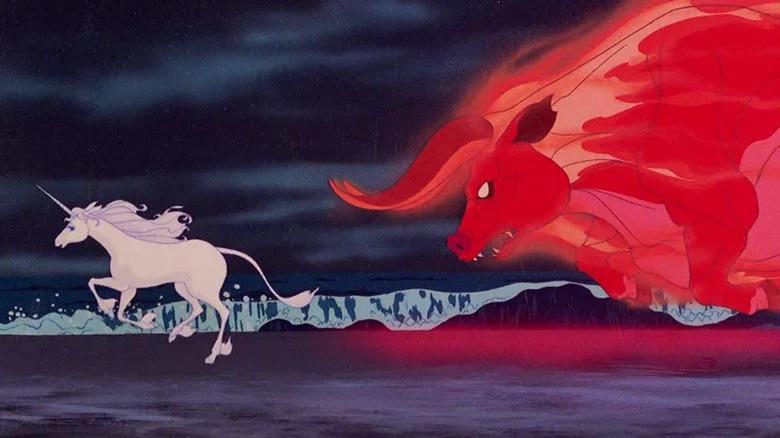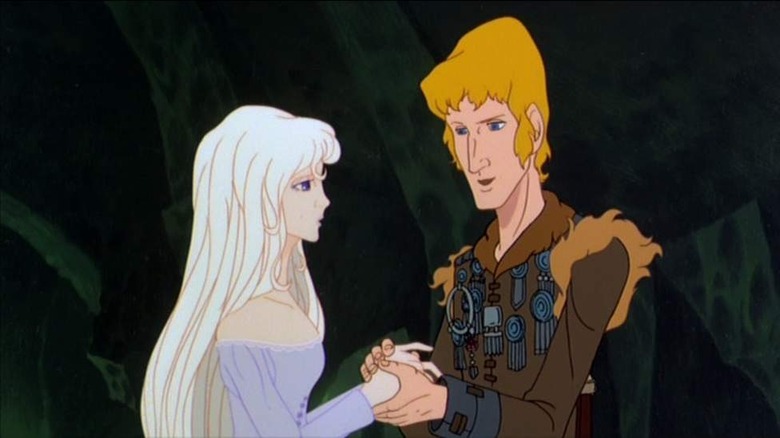They Don't Make Kids' Movies As Weird As The Last Unicorn Anymore
"The Last Unicorn," which just turned 40, is a wild ride! It's a delightfully weird film, strange in a way that movies for children just aren't anymore. Perhaps that's because each generation seems more careful with their kids than the last. This isn't necessarily a bad thing, but I learned a lot from "The Last Unicorn." While some of its lessons may have been over my head at the time, I still think newer kids' films could stand to take a page or two from its book.
With a screenplay by Peter S. Beagle, based on his novel of the same name, "The Last Unicorn" hit theaters in 1982. The reason it makes such a strange children's movie is probably because it wasn't initially intended for children at all. However, that hasn't stopped a generation of kids from falling in love with the unicorn's story. Let's look at some of the weirder aspects of the movie and what lessons modern films could take from this largely forgotten animated classic.
Things get wild
Even the opening credits of "The Last Unicorn" are quite unique. The theme song plays over that sequence, which mirrors the famed "Unicorn Tapestries," also known as "The Hunt of the Unicorn." Did I mention this movie is kind of a musical? The score was composed by Jimmy Webb and performed by '70s band America along with the London Symphony Orchestra. Aside from Webb's score, there are several tunes sung by America, but that's not all the music. The central characters also burst into song a couple times.
From the moment that very stoned butterfly shows up, you know "The Last Unicorn" is going to be wild. As the unicorn (Mia Farrow) explains while struggling to elicit information from the butterfly, all these tiny creatures know are songs, poetry, and snippets of conversations they've overhead. Voiced by Robert Klein, the butterfly's words sound like a stream of consciousness, but there are many references woven in there, from nursery rhymes to plays to children's games, not to mention actually useful information. He does tell the unicorn to beware of the Red Bull.
You know what else was bananas? A living Douglas Fir smothering Schmendrick (Alan Arkin) with her giant breasts! In perhaps the strangest moment in a wonderfully strange film, the inept magician is tied to a tree that he accidentally brings to life and the results are ... traumatizing. Hey, "there is no immortality but a tree's love."
There are some strange characters at Haggard's castle as well. The Skull, played to perfection by Rene Auberjonois, is willing to spill all his secrets for just a taste of wine — doesn't seem like he has much to keep him entertained. There's also a pirate cat (Don Messick) who, like all felines, never gives anyone a straight answer.
And scary too
I have heard the film referred to as nightmare fuel, but I never felt that way about it growing up. Still, there's not only the terrifying Red Bull who keeps all the unicorns trapped in the sea, but also Mommy Fortuna (the late, great Angela Lansbury) and her sad circus of animal illusions. She meets a grisly fate thanks to the escaped harpy she kept imprisoned for so long. The unicorn sets the beast free and she tears the old woman to shreds! You don't really see it, but there's no doubt of what's happening. At least we all learned never to run from anything immortal, because it attracts their attention.
As for the Bull, he is the living embodiment of fear, and there's no saving the unicorns without defeating him. Even King Haggard — who looks exactly like his name suggests — is a different kind of villain from the ones kids are used to seeing. He's not questing for power. It's not some sort of world domination he seeks, but rather ... happiness? Make no mistake, Haggard is a monster willing to go to unforgivable lengths to find joy, something only attained once he's imprisoned the world's most magical creatures. As a kid, I found the idea of the unicorns being trapped in the sea particularly upsetting.
Complex messages
Perhaps the weirdest aspect of "The Last Unicorn" as a movie watched by kids is the complex message at its core. The film ostensibly has a happy ending in which the titular creature saves the rest of her kind, and yet ... those final moments are tinged with sadness because she had to leave her true love behind to do it. It's not all doom and gloom of course. There is definitely joy there too. I mean, we see a tidal wave of unicorns escape from the sea. But holding conflicting emotions isn't easy for adults, let alone children. Kids' movies often oversimplify their themes in the hopes of appealing to their target audience, but the truth is, no one likes to be talked down to.
This movie taught me about mortality, love, and regret at a very young age. Perhaps most importantly, I learned that things don't always end as simply as with a "happily ever after." In "The Last Unicorn," "There are no happy endings, because nothing ends." It's both happy and sad, and much of the point is that one can't exist without the other. The final moments of the film are bittersweet, but beautiful, showcasing some truly lovely dialogue — this movie is filled with unforgettable quotes like, "She will remember your heart when men are fairy tales in books written by rabbits." I only hope the live-action adaptation can do the book justice as well as this animated movie does.



